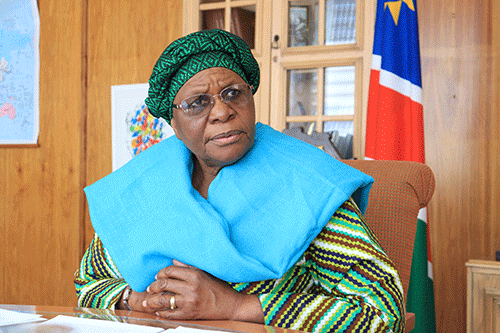Namibia’s Vice President Netumbo Nandi-Ndaitwah said Wednesday that the country’s natural resources rightfully belong to its citizens and called for the implementation of more robust laws to safeguard this ownership.
The vice president made the remarks during the opening ceremony of the 11th edition of the Mining Expo and Conference in Windhoek, the Namibian capital. The two-day event, themed “Green Shoots for Namibia’s Mining Industry: A Season of Opportunity and Growth to Drive Economic Expansion,” features 199 companies across 317 booths.
“Naturally and constitutionally, it is our resources. What we need is a clear law that will protect that ownership,” she said while emphasizing the importance of strong legal frameworks to protect resource ownership and attract investment in the mining sector.
She highlighted Namibia’s growth prospects in the uranium and gold sub-sectors. “In alignment with the clean energy transition, many countries have recognized nuclear power as a sustainable and carbon-neutral base-load source of power and have begun to develop or expand their nuclear power capabilities.”
She also pointed out the significant potential in Namibia’s oil and gas sector, stressing the need for local content policies to ensure Namibians benefit fully from these industries.
The opening of the expo also saw the launch of the National Database of Mining Goods and Services, aimed at helping local businesses access opportunities in the mining sector.
At the event, Tom Alweendo, minister of Mines and Energy, reported an increase in applications for exploration licenses. “As of December 2023, we had over 600 new applications that needed to be evaluated. Since January 2024, we have received over 400 new applications,” he said.
Alweendo noted that many awarded exploration licenses could not fulfill their exploration commitments, leading to a policy change where only applicants meeting minimum exploration work requirements will be granted licenses.
Currently, Namibia holds 162 valid mining licenses, with only 68 in active mining. The rest are either on care and maintenance or have not commenced mining activities since issuance.
The government has introduced a new requirement that the terms and conditions of all new mining licenses be formalized in a mining agreement negotiated between the Ministry of Mines and Energy and the license holder.
Mining and exploration remain vital to Namibia’s economy, creating direct and indirect employment and contributing significantly to government revenue.
XINHUA

